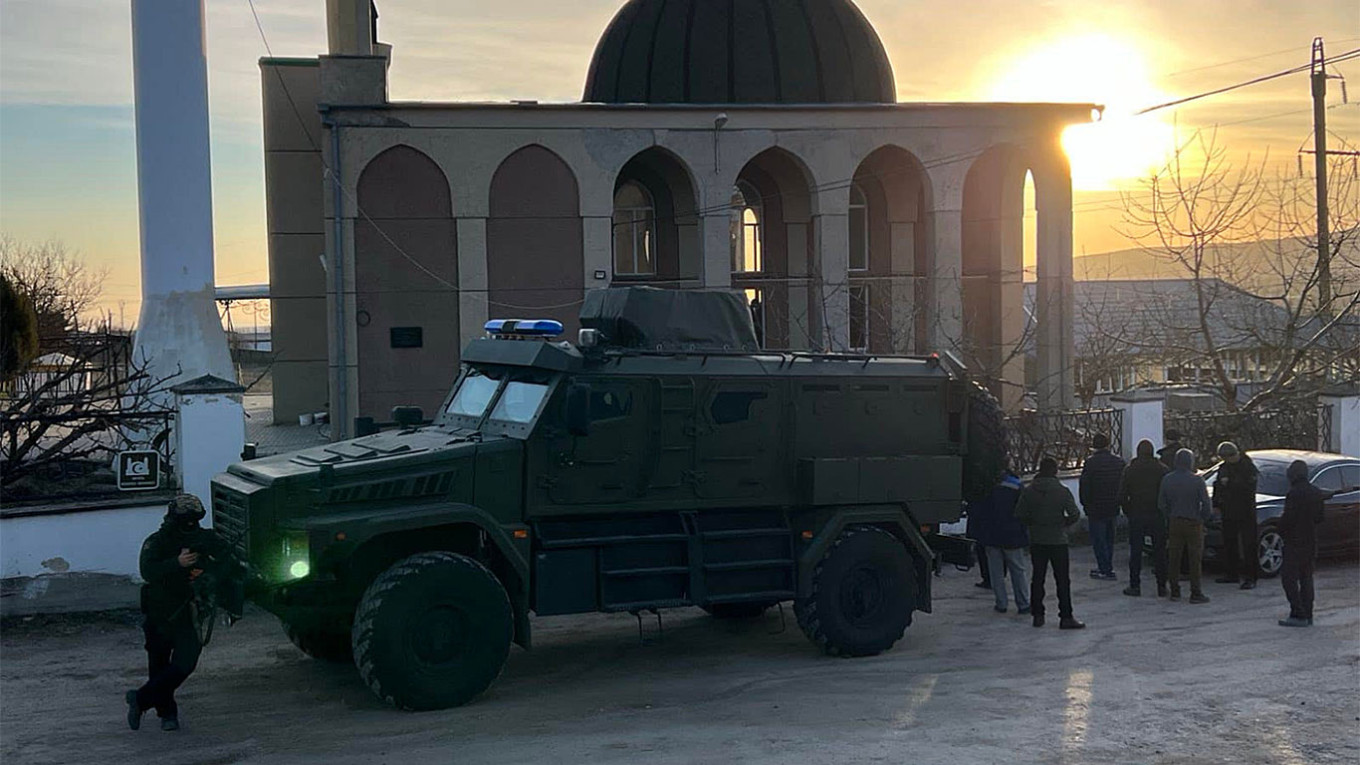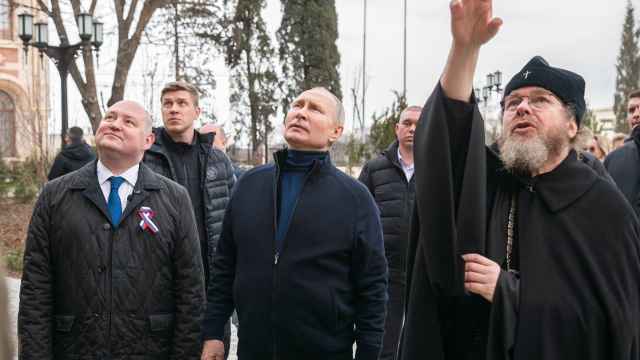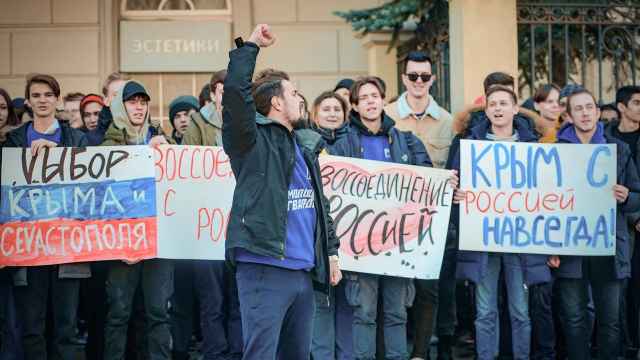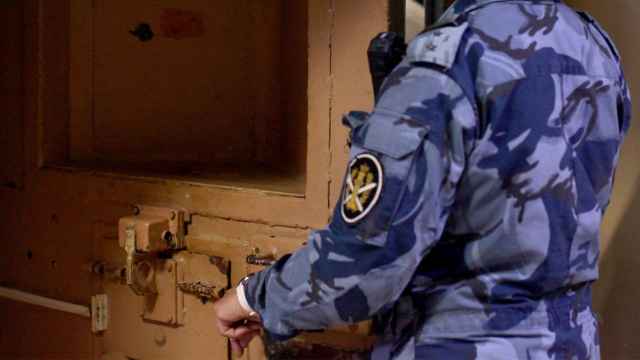On the 10th anniversary of its illegal annexation, Crimea resembles an island. It is cut off from the rest of the world by a wall of lawlessness, behind which the victims of the regime are denied any hope of justice.
As I write these words, thousands of people were protesting against the war in Warsaw, where I live, on the anniversary of Russia's full-scale invasion of Ukraine. It is important that the occupation of Crimea is not forgotten when reminding the world of Russia’s crimes.
It has been a decade since the Crimean Tatars were taken hostage by the Kremlin. On that fateful day, Feb. 26, 2014, they thronged the square in front of the Crimean parliament. They made it impossible for Moscow to fake the voluntary secession of the peninsula, and its subsequent so-called-democratic accession to the Russian Federation.
When that plan failed, Putin decided to use force. On the night of Feb. 26-27, armed men in unmarked uniforms occupied public administration buildings in Simferopol, after which armored vehicles blocked Ukrainian military units throughout the region. Thus began the occupation of parts of Ukrainian territory, which continues to this day. In response, the West imposed political and economic sanctions on Russia. But this did not stop Moscow from taking the war to Ukraine's Donbas.
After the full-scale genocidal invasion of Ukraine in 2022, many inhabitants of occupied Crimea found themselves targeted by the Russian secret services and army. The Crimean Tatars, whom the vengeful Russian president regarded as personal enemies, suffered the worst, being punished for their loyalty to Ukraine.
First, two recognized community leaders, Mustafa Dzhemilev and Refat Chubarov, were prevented from returning to Crimea in 2014. Then, a court in Simferopol outlawed the Mejlis and Kurultai, the self-governing body of Tatars in the region.
These unlawful actions were accompanied by the closure of the only independent media representing the community, Meydan Radio and ATR television station. They were forced to move their headquarters to Kyiv, leaving all their confiscated assets behind.
Almost immediately after the occupation of Crimea, the Crimean self-defense militia — led by local pro-Russian politician Sergei Aksyonov — started to kidnap, torture and murder civilians. The list of political prisoners from Crimea, which has been growing since the start of the full-scale war, now contains almost 80 names. The draconian sentences handed down by the Kremlin range from 15 to 20 years or more in maximum security penal colonies. Human rights defender Iryna Danylovych was abducted in Crimea in February 2022 and then sentenced to seven years in prison based on fabricated evidence. Nariman Dzhelal, a prominent activist and deputy head of the Crimean Tatar Mejlis, was sentenced in September 2022 to 17 years in prison on trumped-up charges of extremism.
Dozens of supporters of Crimean Solidarity — an organization of citizen journalists, religious activists, and the lawyers who defend them — sit in Russian prisons, usually far from their native Crimea. What unites them is their membership of the Crimean Tatar community and the courage to speak out against repression. The numbers speak for themselves: the majority of the 200 victims of the Kremlin's persecution on the peninsula are Crimean Tatars.
What is the fate of this small nation under Russian occupation? The majority of ordinary people have become disengaged from politics and avoid speaking out on issues considered dangerous.
Furthermore, a creeping Russification and destruction of the Crimean Tatar language and community identity are taking place. The Crimean Tatars' survival strategy is not to develop their culture, which they can only dream of, but to preserve themselves physically and avoid forced emigration.
When faced with the possible failure of his army on the battlefield in September 2022, Putin ordered a partial mobilization to call up 300,000 men to fight. Crimea was also covered by this order. Overnight, young Crimean Tatar men began to receive conscription notices. To avoid a fratricidal war, they fled abroad with their families. It was a win-win strategy for the Kremlin, which had always wanted to force its opponents to leave Crimea.
Today, there are no reliable statistics on the number of people who have left the peninsula since 2014. However, human rights organizations estimate that between 30,000 and 50,000 Tatars have left their little homeland for good. Some went to Europe, others made it further afield. It is hard to imagine them returning.
This means that the decades-long, relentless struggle of generations of Crimean Tatar dissidents in the U.S.S.R., demanding the right to return from Stalinist exile to their historic homeland may be in vain. In fact, it is happening before our very eyes. Once again, this small nation is forced from the land of their ancestors and has been scattered around the world.
Who would have thought two decades ago that such a thing was possible, and that the perpetrator would once again be Russian imperialism? The same force that destroyed Crimean Khanate in the 18th century, provoked an exodus and stifled a national revival in the 19th, destroyed half the Crimean Tatar population in the 20th, and now holds it hostage and uses its people as human shields in the war.
One of the biggest challenges, apart from the war and ongoing occupation, is finding a remedy for Russian propaganda and political manipulation. Just to give one example of how easily we have come to believe the mythical support for incorporation among the peninsula's ethnically Russian majority. Outside of the Ukrainian government, no politician has yet challenged the myth that more than 90% of the region's population voted for annexation in the sham referendum of March 16, 2014.
It is not just a question of whether a fair election is possible under the muzzle of a rifle. The point is that too many people are uncritically susceptible to false narratives about the supposed Russianness of Crimea.
Recently, former U.S. President Barack Obama and acting Polish President Andrzej Duda have made unfortunate statements in which they de facto acknowledged Russia’s historic claim over Crimea. This not only illustrates their lack of historical knowledge, but also how helpless even world leaders are in the face of the Kremlin’s manipulation. If we do not become immune to it, our leaders will continue to wave away new acts of Russian aggression with uninformed justification.
It is particularly sad that since 2014, few have asked the Crimean Tatars how they feel about Russia once again taking away their homeland. The Moscow Times is a notable exception. I hope world leaders will finally turn their attention to the Crimean Tatars' plight.
A Message from The Moscow Times:
Dear readers,
We are facing unprecedented challenges. Russia's Prosecutor General's Office has designated The Moscow Times as an "undesirable" organization, criminalizing our work and putting our staff at risk of prosecution. This follows our earlier unjust labeling as a "foreign agent."
These actions are direct attempts to silence independent journalism in Russia. The authorities claim our work "discredits the decisions of the Russian leadership." We see things differently: we strive to provide accurate, unbiased reporting on Russia.
We, the journalists of The Moscow Times, refuse to be silenced. But to continue our work, we need your help.
Your support, no matter how small, makes a world of difference. If you can, please support us monthly starting from just $2. It's quick to set up, and every contribution makes a significant impact.
By supporting The Moscow Times, you're defending open, independent journalism in the face of repression. Thank you for standing with us.
Remind me later.








